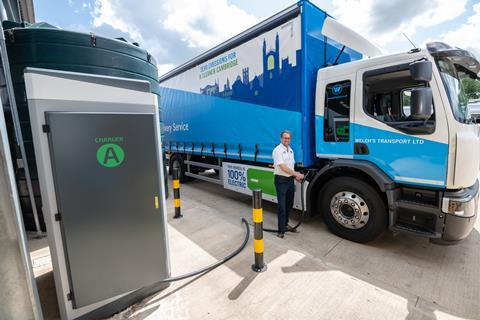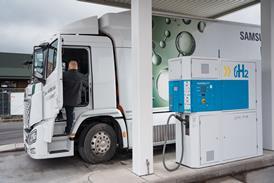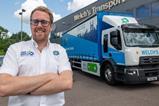As part of a new research project with Cambridge University and technology firm Syselek - called ENROUTE - Welch’s Transport is seeking operators and other stakeholders in the freight decarbonisation space to give their opinion around the data sharing aspects of shared user charging for electric HGVs.

The nine-month ENROUTE project – which stands for Efficient Network for Road-freight Optimisation, Utilisation, and Transfer of Energy – aims to show the value of live data sharing across the freight sector for electric HGV Charging.
The feasibility study seeks to address key data sharing barriers, such as commercial sensitivity and privacy concerns, with an overall goal of eventually developing software that will enable shared user charging in a safe, convenient and cost-effective way for road transport operators.
Chris Welch, MD of Welch’s Transport, called on all his peers in the decarbonisation and road transport space, to take the ENROUTE survey. “The five-minute questionnaire will help the ENROUTE team understand challenges, opportunities, and concerns with data sharing in the eHGV ecosystem. This will inform charging infrastructure investment and accelerate electric HGV adoption.”
The survey is open to anyone in the road freight decarbonisation ecosystem as the study will benefit from different points of view. Jamie Sands, Head of Solutions at Welch Group, elaborated: “We want to hear from anyone with an interest in the electrification of HGVs - be it hauliers, charge point operators, consultants, associations, energy providers - because how different parts of the ecosystem view the issues around shared user charging will really help enrich the project.”
Welch’s Transport has been running a Renault 19-tonne electric truck - the E-Tech D Wide – since last summer, which put the Cambridge-based operator on the map for being one of the first UK hauliers to run a fully electric HGV. Investing in its own 150 Kw rapid Charger at its base in Duxford, Cambridge, Welch’s declared it a ‘publicly accessible HGV charging point’, and in the last six weeks has had its first official ’shared user charging’ customer.
Welch explained: “Local transport firm Voltloader move grains around the East of England using solely electric vehicles; we’ve agreed a commercial relationship where they can come into our depot five or six times a week to extend the range of their operations. They’re now able to make deliveries that they wouldn’t otherwise be able to by using our charger as a midway top-up.”
The agreement with Voltloader is a prime example of how shared user charging can work – and is working – which ties back in with Welch’s involvement with the ENROUTE project.
“Essentially we wear two hats – we are a transport operator but also an EV charge point operator – so we understand both sides of the equation,” Welch told FCZ. “Although the arrangement is all done manually at the moment between ourselves and Voltloader, eventually, with the software or app that might come out of the ENROUTE project, this will be digitised so that a driver needing a charge can easily find and book the nearest HGV charging site at the click of a button.”
Welch is a strong advocate for a shared user charging model for the sector, as “it’s no different to the shared fuel bunkering arrangements that we have within the Transport Association” he points out.
Sands concluded: “We firmly believe that a shared charging model, especially in the early stages while the industry is waiting for the infrastructure to catch up, is going to be key for operators to electrify their fleets. At this stage, ENROUTE is a feasibility study, but there will be commercial applications coming off the back of it that will be for everyone’s benefit in the sector.”
To complete the ENROUTE shared user charging survey, click here.
















